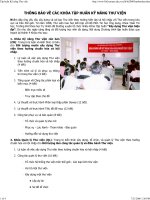Tập huấn kĩ năng Team Building
Bạn đang xem bản rút gọn của tài liệu. Xem và tải ngay bản đầy đủ của tài liệu tại đây (617.87 KB, 35 trang )
Team Building
Sharon Doner-Feldman
Training for You
What is Teamwork & Team Building
Teamwork
Concept of people working together as a team
Team player
A team player is someone who is able to get along with their
colleagues and work together in a cohesive group
Team Building
Process of establishing and developing a greater sense of
collaboration and trust between members
Te amwo rk
“Create A Story”
Why Should We Be a Team?
When staff use their skills and knowledge together,
the result is a stronger agency that can fulfill its
mission
“To provide accurate information that would assist
individuals in achieving a better quality of life.”
People working together can sustain the enthusiasm
and lend support needed to complete the work of
each program.
How does a Team Work Best?
A Teams succeeds when its members
have:
a commitment to common objectives
defined roles and responsibilities
effective decision systems, communication
and work procedures
good personal relationships
Team Morale Depends On
Support
Resources
Communication
Personalities
Teamwork Skills
Listen
Question
Persuade
Respect
Help
Share
Participate
Stages in Team Building
Forming
Storming
Norming
Performing
Stage 1: FORMING
The Te am
defines the problem
agrees on goals and formulates strategies for
tackling the tasks
determines the challenges and identifies
information needed
Individuals take on certain roles
develops trust and communication
Team Roles - Leader
Encourages and maintains open communication
Leads by setting a good example
Motivates and inspires team members
Helps the team focus on the task
Facilitates problem solving and collaboration
Maintains healthy group dynamics
Encourages creativity and risk-taking
Recognizes and celebrates team member
contributions
Other Team Roles – Members Can Formally
or Informally Take on These Roles
Initiator
- Someone who suggests new ideas. One or more people can have this role
at a time.
Recorder - This person records whatever ideas a team member may have. It is
important that this person quote a team member accurately and not "edit" or
evaluate them.
Devil's Advocate/Skeptic - This is someone whose responsibility is to look for
potential flaws in an idea.
Optimist - This is someone who tries to maintain a positive frame of mind and
facilitates the search for solutions.
Timekeeper
- Someone who tracks time spent on each portion of the meeting.
Gate Keeper - This person works to ensure that each member gives input on an
issue. One strategy to do this is to ask everyone to voice their opinion one at a time.
Another is to cast votes.
Summarizer - Someone who summarizes a list of options.
From Individuals
A Group Forms
Help members understand each other
Myers-Briggs Type Indicator (MBTI)
Extraverts -----------------Sensors --------------------Thinker ---------------------Judger -----------------------
Introverts
iNtuitive
Feelers
Perceiver
By selecting one from each category, we define our
personality type, ESTJ, ENTJ…INFP
Relevance to Teams (E/I)
Extraverts
–
–
–
Need to think
aloud
Great explainers
May overwhelm
others
Introverts
–
–
–
Need time to
process
Great
concentration
May not be heard
Relevance to Teams (N/S)
iNtuitive
–
–
–
Great at big
picture
See connections
May make
mistakes in
carrying out
plans
Sensor
–
–
Great executors
May miss big
picture, relative
importance
Relevance to Teams (T/F)
Thinker
–
Skillful at
understanding
how anything
works
Feeler
–
Knows why
something
matters
Relevance to Teams (J/P)
Judger
–
–
–
Good at
schedules, plans,
completion
Makes decisions
easily (quickly)
May overlook
vital issues
Perceiver
–
–
Always curious,
wants more
knowledge
May not get
around to acting
What Type are You?
Online Personality Tests
Jung types
/>htm
Keirsey types
/>
Stage 2: STORMING
During the Storming stage team
members:
realize that the task is more difficult than
they imagined
have fluctuations in attitude about
chances of success
may be resistant to the task
have poor collaboration
Storming Diagnosis
Do we have common goals and objectives?
Do we agree on roles and responsibilities?
Do our task, communication, and decision
systems work?
Do we have adequate interpersonal skills?
Negotiating Conflict
Separate problem issues from people issues.
Be soft on people, hard on problem.
Look for underlying needs, goals of each
party rather than specific solutions.
Addressing the Problem
State your views in clear non-judgmental
language.
Clarify the core issues.
Listen carefully to each person’s point of
view.
Check understanding by restating the core
issues.
Stage 3: NORMING
During this stage members accept:
–
–
–
–
their team
team rules and procedures
their roles in the team
the individuality of fellow members
Team members realize that they are not
going to crash-and-burn and start helping
each other.
Behaviors
Competitive relationships become more
cooperative.
There is a willingness to confront issues
and solve problems.
Teams develop the ability to express criticism
constructively.
There is a sense of team spirit.
Giving Constructive Feedback
Be descriptive
Don't use labels
Don’t exaggerate
Don’t be judgmental
Speak for yourself
Giving Constructive Feedback
Use “I” messages.
Restrict your feedback to things you know for
certain.
Help people hear and accept your
compliments when giving positive feedback.








